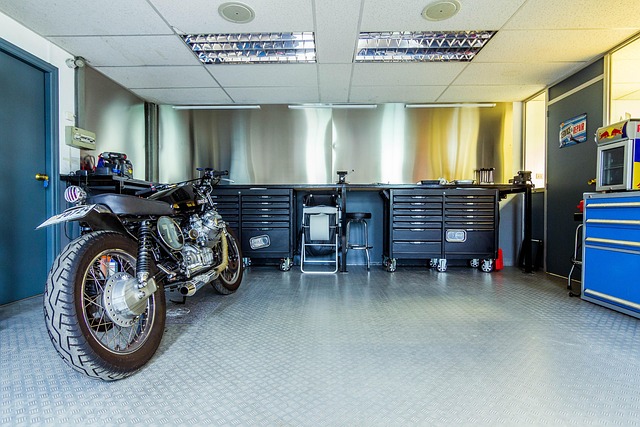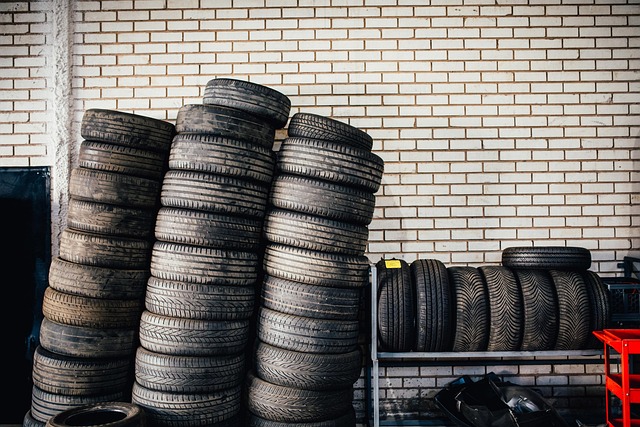Tesla EV Collision Specialist: Decoding Cost Breakdown for Better Repair Choices
Tesla EV Collision Specialists are crucial professionals repairing and restoring electric vehicles&#…….
In the rapidly evolving landscape of electric vehicles (EVs), the role of specialized collision repair services has become increasingly pivotal. This article delves into the concept of a “Tesla EV Collision Specialist,” exploring its purpose, impact, and potential to redefine the post-collision restoration process for Tesla vehicles and beyond. As the world embraces electrification in transportation, understanding how these specialists cater to the unique needs of EV owners is essential for both industry professionals and enthusiasts.
A Tesla EV Collision Specialist is a highly skilled and trained repair shop specializing in the restoration of Tesla electric vehicles after an accident or collision. This specialization encompasses several key aspects:
Technical Expertise: These specialists possess in-depth knowledge of Tesla vehicle models, their advanced electrical systems, and the intricate architecture of EV powertrains. They understand the complexities of high-voltage battery packs and how to handle them safely during repair.
State-of-the-Art Equipment: The workshops are equipped with specialized tools and diagnostic equipment designed for EVs. This includes advanced scanning tools to identify damage, precision cutting tools for panel replacement, and specialized machinery for body alignment without compromising the vehicle’s structural integrity.
Training and Certification: Collision specialists undergo rigorous training programs focused on Tesla EV repair techniques. These programs ensure they stay updated with the latest manufacturing processes, safety protocols, and technological advancements specific to Tesla vehicles. Many have earned certifications from Tesla or recognized industry bodies.
The concept of specialized EV collision repair gained prominence as Tesla’s vehicle lineup expanded and their cars became more widespread. Initially, general automotive repair shops tackled Tesla collision repairs, but the complexity of these vehicles soon demanded a more tailored approach:
Early Challenges: Early Tesla models, while revolutionary in design, presented unique challenges for collision repairers due to their advanced battery systems and specialized components. Standard repair practices often left damage or created new safety hazards.
Specialization Emerges: Recognizing the need for expertise, Tesla and industry associations began offering training programs to educate and certify professionals in EV collision repair. This marked the beginning of a dedicated community of specialists equipped to handle Tesla vehicles’ unique post-collision needs.
Benefits: Specialized collision repair offers several advantages:
The influence of Tesla EV collision specialists extends far beyond local workshops, shaping the global automotive industry:
| Region | Key Developments |
|---|---|
| North America | The United States leads in Tesla EV adoption, resulting in a growing network of specialized collision repair centers. Companies like Tesla and industry associations offer training programs to ensure high-quality repairs. |
| Europe | With strict environmental regulations encouraging EV sales, European countries are witnessing an uptick in specialized repair services. Germany, known for its automotive expertise, is a hub for EV collision repair innovation. |
| Asia Pacific | China, as the world’s largest EV market, is seeing rapid development of local and international EV collision repair specialists. Japan’s traditional automotive industry is integrating EV-specific training into their service offerings. |
| Global Trends | – Increasing EV adoption drives demand for specialized repair services. – Online training platforms offer remote learning opportunities, enabling global access to expertise. – The rise of autonomous driving technology will further complicate crash scenarios, requiring advanced repair techniques. |
The Tesla EV collision specialist market is a dynamic segment within the broader automotive aftermarket:
Market Growth: The global electric vehicle market is projected to reach $837 billion by 2030, according to Grand View Research. This massive growth translates to increased demand for specialized repair services, especially as battery electric vehicles (BEVs) become more prevalent.
Investment Opportunities: Recognizing the potential, investors are backing startups and established companies focused on EV collision repair technology and training. Funding rounds often target innovative solutions that enhance safety, reduce costs, or streamline repairs.
Economic Impact:
Technological advancements play a pivotal role in defining the capabilities of Tesla EV collision specialists:
Advanced Battery Repair: Newer technologies enable more precise battery pack repair, reducing disposal and environmental impact. Laser welding techniques, for instance, offer faster and cleaner repairs for lithium-ion batteries.
Virtual Reality (VR) Training: VR simulations provide immersive training environments, allowing specialists to practice complex procedures in a risk-free setting. This enhances skill development and ensures consistency in repair techniques.
Artificial Intelligence (AI) Diagnostics: AI algorithms can analyze sensor data and visual inputs to assess vehicle damage, speed up the diagnostic process, and improve accuracy.
Robotic Automation: Robotic systems assist in precise body shop operations, improving efficiency and reducing human error. These robots can handle repetitive tasks, allowing specialists to focus on complex repairs.
Key policies and regulations shape the operating environment for Tesla EV collision specialists:
Safety Standards: Governments worldwide mandate safety standards for all vehicles, including EVs. These standards cover crash testing, battery management, and repair requirements, ensuring consumer protection.
Emission Regulations: Strict emission controls drive EV adoption, creating a larger market for specialized collision repairers. Compliance with environmental standards becomes a competitive advantage.
Waste Management: Proper disposal and recycling of EV batteries are critical issues. Regulations mandate responsible handling, impacting how collision specialists manage damaged or discarded battery packs.
Consumer Protection: Laws protect consumers from fraudulent repairs and ensure transparency in pricing and service quality. For specialized EV services, this includes certification programs that verify specialist credentials.
Despite its growth potential, the Tesla EV collision specialist field faces several challenges:
Specialized Training: Securing access to high-quality training remains a hurdle for aspiring specialists. Continuous investment in education and certification programs is essential to maintain industry standards.
Competing with General Repairs: Differentiating specialized services from general automotive repair shops can be challenging, especially as EV technology becomes more mainstream. Marketing and brand building are crucial to establishing expertise.
Technological Obsoletion: Rapid technological advancements may render certain skills obsolete quickly. Specialists must stay agile and adaptable, embracing new technologies and methods.
To address these challenges:
Industry Collaboration: Companies like Tesla, insurance providers, and government bodies should collaborate to develop comprehensive training programs, ensuring a skilled workforce.
Certification Standards: Implementing and promoting recognized certification programs ensures quality control and consumer trust.
Research Funding: Investing in research for EV battery repair technologies and safety protocols will drive innovation and enhance the capabilities of specialists.
The following case studies illustrate successful Tesla EV collision specialist operations:
Case Study 1: Green Repair Initiative (North America)
Green Repair Initiative is a leading North American network of EV collision repair centers. They implemented an extensive training program, “EVX Academy,” which covers advanced battery repair, electrical system diagnostics, and sustainable disposal practices. This initiative resulted in faster turnaround times, reduced costs for clients, and a 20% decrease in EV waste sent to landfills over two years.
Case Study 2: Tokyo Electric Auto Care (Asia)
Tokyo Electric Auto Care, a Japanese specialist, developed an AI-assisted diagnostic system that analyzes vehicle sensor data to predict potential collision damage before visual inspections. This technology reduces repair times and enhances accuracy, setting a new standard for efficient EV collision repair in Asia.
Case Study 3: EuroEV Rescue (Europe)
EuroEV Rescue, based in Germany, offers mobile EV collision repair services, utilizing remote diagnostics and advanced robotic tools for on-site repairs. Their innovative approach has reduced the average repair duration by 30%, allowing them to cater to a growing European market with minimal environmental impact.
The future of Tesla EV collision specialists is promising, with several growth areas and trends shaping the industry:
Autonomous Vehicles: As autonomous driving technology advances, collision scenarios will evolve. Specialists will need to adapt to repairs involving advanced driver assistance systems (ADAS) and autonomous vehicle hardware.
Global Expansion: The rise of electric mobility across emerging markets presents significant opportunities for specialized repair services in regions like Southeast Asia, South America, and Africa.
Sustainable Practices: There will be increasing demand for eco-friendly repair methods and materials, aligning with the broader automotive industry’s sustainability goals.
Remote Diagnostics and Online Repairs: Technological advancements may enable remote diagnosis and basic repairs, reducing the need for physical visits, especially for less severe cases.
Tesla EV collision specialists play a pivotal role in supporting the widespread adoption of electric vehicles. Their expertise, coupled with technological innovations, ensures that Tesla and other EV owners receive high-quality, safe, and efficient post-collision restoration services. As the industry continues to evolve, these specialists will remain at the forefront, adapting to new technologies, regulatory changes, and consumer expectations.
Q: How do I know if a repair shop is specialized in Tesla EV collisions?
A: Look for certifications from Tesla or recognized automotive associations. Specialized shops should have advanced training and equipment tailored to Tesla vehicles.
Q: Are regular car repair shops capable of handling Tesla EV collisions?
A: While general repair shops can perform basic repairs, complex EV systems like high-voltage batteries require specialized knowledge and tools, which not all traditional shops possess.
Q: What are the common challenges faced by EV collision specialists?
A: Challenges include keeping up with rapid technological advancements, obtaining specialized training, and managing the unique disposal and recycling requirements of EV battery packs.
Q: How can I reduce costs for Tesla EV collision repairs?
A: Shop around for estimates, consider certified specialists who offer competitive pricing, and keep your vehicle well-maintained to prevent future damage.
Q: Will my Tesla insurance cover all collision repair costs?
A: Insurance coverage varies; review your policy or contact your insurer to understand what is covered, especially for EV-specific repairs and parts.

Tesla EV Collision Specialists are crucial professionals repairing and restoring electric vehicles&#…….

Tesla EV collision specialists face unique challenges due to the advanced technology and intricate d…….

Tesla EV collision specialists offer tailored services for electric vehicle repairs, addressing both…….

A proficient Tesla EV collision specialist is a master of both technology and craftsmanship, certifi…….

Tesla EV collision specialists are trained professionals who understand the unique needs of electric…….